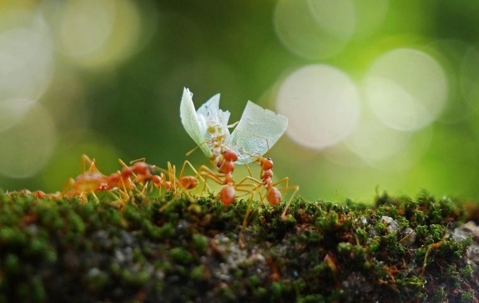Natural Ways To Get Rid Of Ants
September 06, 2023 - Ants
There are several natural methods to effectively eliminate ants from your home or garden without resorting to harsh chemicals. These methods are eco-friendly and safe for both humans and pets. Here are some strategies you can employ:
White Vinegar For Ants
Using vinegar to get rid of ants is a popular and effective natural remedy. Vinegar works because of its strong scent and its ability to disrupt the ants' communication through pheromone trails. Here's a more detailed explanation of how to use vinegar to combat ants:
Preparation: You will need white vinegar, water, and a spray bottle. It's best to use white vinegar because it is clear and has a strong odor that ants dislike.
Mixing the Solution: Create a vinegar solution by mixing equal parts of white vinegar and water. This dilution ensures that the vinegar scent is potent enough to deter ants without being too overpowering.
Identifying Ant Trails: Before applying the solution, observe the ants' movements to identify their trails and entry points. Ants leave scent trails to guide others to food sources, so disrupting these trails is essential.
Application: Use the spray bottle to apply the vinegar solution directly onto ant trails, entry points, and areas where you have noticed ant activity. The vinegar scent will interfere with their ability to follow the trail and deter them from entering your home.
Repeat as Needed: Depending on the severity of the infestation, you may need to reapply the vinegar solution regularly, especially after cleaning or when you notice ants returning. Persistence is key to breaking their trail and discouraging them from coming back.
While vinegar is a natural and safe solution for humans and pets, it may not eliminate the entire ant colony. For severe infestations or persistent problems, it may be necessary to combine vinegar with other natural methods or seek professional pest control assistance. Additionally, vinegar's strong scent may not be appealing to some people, so consider your personal preferences when using it as an ant repellent.
Diatomaceous Earth For Ants
Diatomaceous earth (DE) is a natural and safe substance derived from fossilized algae, often used as an effective method to control and eliminate ants and other crawling insects. DE works by physically damaging the exoskeleton of insects, leading to their dehydration and eventual death. Here's how to use diatomaceous earth for ant control:
Choose Food-Grade DE: When using diatomaceous earth for pest control, it's crucial to select food-grade DE, which is safe for humans and pets. Do not use industrial-grade DE, which is used for pool filtration and contains harmful impurities.
Safety Precautions: Wear a dust mask and gloves when handling DE to avoid inhaling the fine particles. Although food-grade DE is generally safe, it can still irritate the respiratory system if inhaled in large quantities.
Locate Ant Nests and Trails: Identify the areas where ants are most active, including their nests and foraging trails. DE is most effective when applied directly in these areas.
Application: Lightly dust a thin layer of food-grade diatomaceous earth around ant entry points, nesting sites, and along their trails. Use a powder duster, a small brush, or even your hands to apply it evenly. Make sure to cover the areas where ants are likely to come into contact with the powder.
Reapply as Needed: DE is not immediately lethal to ants but takes time to work. As ants come into contact with the powder, it clings to their bodies and begins to damage their exoskeleton. Ants will eventually die due to dehydration. You may need to reapply DE regularly, especially after rain or when you notice new ant activity.
Indoor Use: You can also use DE indoors, but be cautious not to apply excessive amounts in areas where it may become airborne and cause respiratory irritation. Focus on cracks, crevices, and areas where ants enter your home.
Monitor and Clean: Continue to monitor the treated areas and clean up any ant carcasses regularly. DE will remain effective as long as it remains dry.
Keep in mind that DE is not selective and can harm other beneficial insects, so use it sparingly and only in areas where you have an ant problem. Additionally, DE may take some time to control an ant infestation fully, so patience and persistence are key when using this natural method.
Does Cinnamon Get Rid Of Ants?
Yes, cinnamon can be used as a natural method to deter and get rid of ants. Cinnamon is a spice with a strong and pleasant scent that ants find repulsive. When used correctly, it can disrupt their pheromone trails and discourage them from entering your home. Here's a more detailed explanation of how to use cinnamon for ant control:
Identify Ant Entry Points: First, locate the areas where ants are entering your home or where they are most active. These are typically around windowsills, door frames, cracks in walls, or along ant trails.
Sprinkle Ground Cinnamon: Sprinkle ground cinnamon directly along the ant paths, entry points, and any areas with high ant activity. You can also create barriers of cinnamon near these locations. Ants will avoid crossing over cinnamon lines due to its scent.
Use Cinnamon Sticks: Placing cinnamon sticks or whole cloves in areas where ants are a problem can also be effective. These release a consistent cinnamon scent over time, acting as a deterrent.
Reapply as Needed: Cinnamon's scent may fade over time, so you may need to reapply it regularly, especially after cleaning or when you notice ants returning. Consistency is essential for long-term effectiveness.
Combine with Other Methods: Cinnamon can be used in conjunction with other natural ant control methods, such as vinegar or diatomaceous earth, for enhanced results.
While cinnamon is a natural and safe way to deter ants, it may not completely eliminate the entire ant colony. For severe infestations or persistent problems, you may need to combine cinnamon with other natural methods or seek professional pest control assistance. Nonetheless, cinnamon can be a valuable tool in your arsenal for keeping ants at bay in a safe and eco-friendly manner.
Customer Review

Great Service! A++ , would recommend 100%


